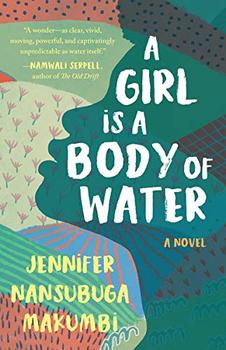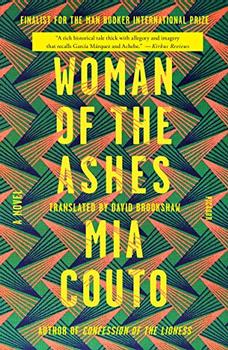Summary | Excerpt | Reviews | Beyond the book | Read-Alikes | Genres & Themes | Author Bio

Kintu refers to Kintu Kidda, the governor of Buddu Province in the kingdom of Buganda, which is now part of Uganda. Jennifer Nansubuga Makumbi's Commonwealth Prize-winning novel opens in 1754. On his way with his men to pay homage to the new king, Kintu overreacts to a minor situation with anger and violence, resulting in the accidental death of one of his fellow travelers. His further actions on returning home compound his sin and lead to a curse — one that results in his family's ruin and haunts descendants through succeeding generations. As the novel tells the story of Kintu Kidda and his extended family, it vividly relays Uganda's past and culture.
Subsequent sections, set in Uganda in January 2004, focus on different arms of the Kintu clan. Each highlights the branch's elder and describes the effects of the Kintu curse on members. As these men and women move toward an Easter Sunday reunion at which they plan to discuss how to rid the family of this scourge, the author describes the challenges they face, not only in the present but in overcoming past events. The people portrayed are at different places in their lives – for example, 74-year-old Kanani Kintu has lived through Uganda's occupation by the British and subsequent independence, while Suubi Nnakintu is a young woman in her mid-20s in search of her family roots after being abandoned as a child. The characters are multifaceted and unique, and the author takes advantage of their differences to discuss wide-ranging aspects affecting Ugandan society today — including attitudes towards AIDS, the Ugandan educational system, and the long-lasting impacts of colonialism.
Makumbi's writing is nothing short of brilliant, often bordering on poetic, as she writes about Ugandan culture, past and present. More than just descriptions, she captures a depth of emotion that few can adequately express in writing; what each of her characters endure is palpable.
[Kamu's] woman ran to the road. In the distance, she saw a body lying on the ground with a block on top of its head. She recognized the gray trousers and the sandal. She ran back to the house and locked the door. Then she trembled. Then she sat on the armchair. Then she stood up and held her arms on top of her head. She removed them from her head and beat her thighs whispering, "Maama, maama, maama," as if her body were on fire. She sipped a long sustained breath of air to control her sobs but her lungs could not hold so much air for so long – it burst out in a sob. She shook her body as if she were lulling a crying baby on her back but in the end she gave up and tears flowed quietly. She refused to come out to the women who knocked on her door to soothe and cry with her. But solitary tears are such that they soon dry…She asked herself, "Do you have his child? No. Has he introduced you to his family? No. And if you had died, would Kamu slip you between earth's sheets and walk away? Yes."…The following morning, the two rooms Kamu and his woman had occupied were empty.
The author resists the current literary tendency toward very short chapters that bounce between characters. Instead she allows readers to become fully immersed in each person's story, completely getting to know all aspects of their personality and motivations before moving on to the next individual's circumstances. It's honestly some of the best characterization I've ever read. The reader comes to know the characters; they become real. You may not always like them, but you do understand why they behave as they do.
While unfamiliar terms are translated, this is a novel written for readers with some knowledge of Uganda's recent history. Very little is pasteurized for consumption by those unfamiliar with African culture, and names and places will be alien to many readers. Although the characters make the book exceptional, my experience would have been richer if I'd had a better understanding of the country's recent past (see 'Beyond the Book') before diving in. But this doesn't mean that global audiences won't enjoy Kintu. Themes such as poverty, women's roles in society and the conflict between past and present are universal, and the author has a superb ability to present and analyze them. The unfamiliar words and the overall foreign-feeling cadence of Makumbi's writing slowed down my reading, especially initially.
Also, Uganda has a violent past, and as the book deals with the country's history, it can be brutal at times. There are many scenes in which individuals are treated savagely, and children, too, are regularly abused. The novel consequently may not be appropriate for sensitive readers.
That said, Kintu is by far my favorite book of the year (perhaps of the past several), and it will undoubtedly appeal to fiction lovers who enjoy immersing themselves in other cultures. I found this debut absolutely unforgettable and am sure it will win Makumbi many fans. Highly recommended!
![]() This review
first ran in the June 21, 2017
issue of BookBrowse Recommends.
This review
first ran in the June 21, 2017
issue of BookBrowse Recommends.

If you liked Kintu, try these:

by Jennifer Nansubuga Makumbi
Published 2021
International-award-winning author Jennifer Nansubuga Makumbi's novel is a sweeping and powerful portrait of a young girl and her family: who they are, what history has taken from them, and--most importantly--how they find their way back to each other.
Published as The First Woman in the UK.

by David Brookshaw, Mia Couto
Published 2019
The first in a trilogy about the last emperor of southern Mozambique by one of Africa's most important writers.
Your guide toexceptional books
BookBrowse seeks out and recommends the best in contemporary fiction and nonfiction—books that not only engage and entertain but also deepen our understanding of ourselves and the world around us.